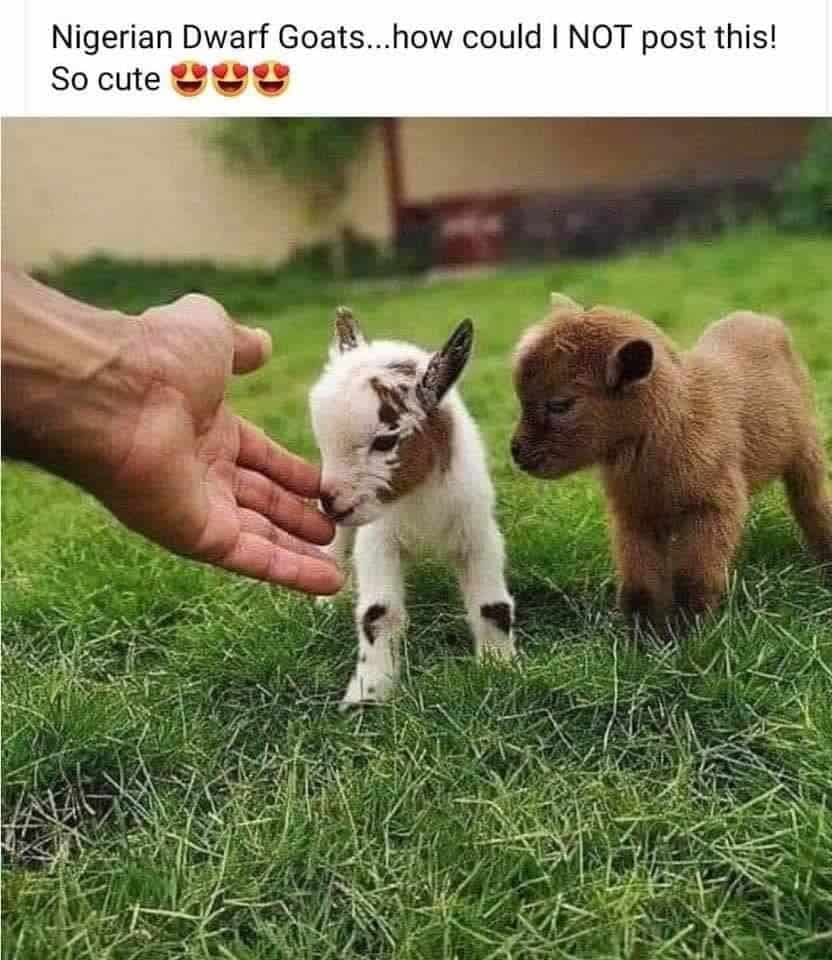Are Nigerian dwarf goats friendly? Let’s talk about why these little powerhouses are increasingly being welcomed onto hobby farms and hearts! Here’s what to know about owning Nigerian dwarf goats.
These dwarf goats are proof that the best pets sometimes come in small packages. They are excellent mini-milk producers as well. Hearing how playful they are just might goad you into becoming a goat owner!
Are Nigerian dwarf goats friendly?
Yes, Nigerian dwarf goats are friendly, and you can keep them as pets. They have a sweet temperament. Nigerian dwarf goats are famed for their gentle, friendly disposition. Nigerian dwarfs really are every bit as sweet as they look!
This means you can have peace of mind about interactions with families and children. In fact, they tend to do exceptionally well with children.
Every goat has its own “personality.” However, the general consensus is that you are unlikely to encounter one with a behavior issue. Nigerian dwarf goats, with their friendly temperaments, are ideal for families and hobby farmers.
In addition, homesteaders who open their properties to the public for agricultural tourism also have a special affinity for Nigerian dwarfs. Even with their friendly dispositions, like with many animals, it’s still best to socialize them when they are young.
Nigerian dwarf goats as pets
Nigerian dwarf goats make good pets, and you can easily train them to walk on a leash. Before deciding on males or females, you need to decide your purpose for wanting to own Nigerian dwarf goats. Many prefer to start with Nigerian dwarf goat kids (babies).
Nigerian dwarf goat wethers
If your purpose is to have them as pets, and you are a beginner goat owner, you should start with wethers (neutered male goats). The benefit to owning wethers is you can enjoy these playful, friendly goats much like you would other pets.
Nigerian dwarf goat does
If you want to keep Nigerian dwarf goats as pets and for milk, you should start with does (female goats). The benefit of owning Nigerian dwarf goat does is you will have the benefit of milk as the goats mature.
Know that while they’ll also be fun to have on your farm, if you choose Nigerian dwarf females, you will have to milk them. Mature female Nigerian dwarf goats will produce milk. Therefore, you will need to milk them to eliminate pain and reduce infection risk.
Nigerian dwarf goat bucks
If you are just starting out with goats and livestock animals, you may not want to start with a buck (intact male goat). A Nigerian dwarf buck will be friendly and playful. However, he will be overall more challenging than a wether goat and dwarf does as he matures.
If you start with Nigerian dwarf goat bucks, bring them home when they are young. You will want to enjoy them when they are younger before they are mature enough to mate. While they are friendly by nature, in this way, you can also ensure they are socialized with your family. Learn when can baby goats go outside so they stay healthy and safe.
How big do Nigerian dwarf goats get?
The most obvious perk of this goat breed is its size. Dwarf goats are petite. How big does a Nigerian dwarf goat get? According to the Colombian Park Zoo:
- Nigerian dwarf goat females average between 16 – 21″ tall (41 – 53cm)
- Nigerian dwarf males average 23.5″ (59.6cm) tall at their full height
According to the USDA Cooperative Goat Extension, a Nigerian dwarf goat full grown is 75 pounds, with wethers and bucks weighing more than does. A Nigerian dwarf, when fully grown, is about the same size as many common dog breeds.
What are Nigerian dwarf goats good for
In addition to having friendly personalities and making good pets, Nigerian dwarf goats have other attributes as well. Some reasons to own them are:
- Small size, manageable
- Great-tasting milk with butterfat (females)
- Easy to care for
- Help with your garden and lawn
- Good companion animals
- Great for livestock projects, 4-H, Future Farmers of America (FFA), etc.
Nigerian dwarf goats have many attributes making them a viable livestock option. In addition, they are a great first choice for homesteaders who are just starting out with animals on their property.
Let’s talk about what these animals do when they live on your property. In addition to being friendly, adorable companions, many people raise goats for profit.
Nigerian dwarf goats milk
Nigerian dwarf milk goats actually serve a big purpose on your land. The first benefit is Nigerian dwarf goats provide milk. This may be intriguing to you if you’re interested in homesteading without bringing in full-sized goats or cattle. Nigerian dwarf milk goats are powerhouses when it comes to mini-milk production.
Many homesteaders actually prefer the milk of Nigerian dwarfs when making organic goat soap or cheese to sell. Yes, milk production alone is enough to make a Nigerian dwarf goat an asset to a property.
How much milk do Nigerian dwarf goats produce?
Nigerian dwarf goats can produce up to two quarts of milk per day. In fact, the American Dairy Goat Association (ADGA) ranks them as the most popular dairy goat breeds.
If you want them for milk, consider starting with two high quality female kids. It will take a year or longer to get milk. Another option is to start by buying a mother and a baby doe.
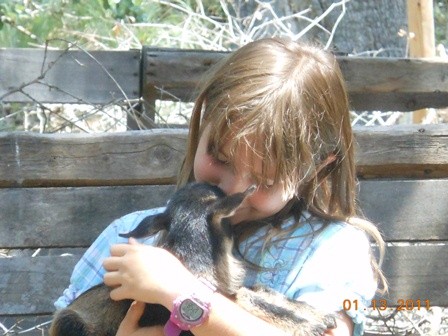
Nigerian dwarfs
Good for gardens
Nigerian dwarfs can help to make your garden grow! This is because they produce very nutrient-dense waste for composting. In addition to making compost, goats will help control weeds and grasses by grazing.
Good for small properties
Nigerian dwarfs really give you a lot for a little. Their small size means that you can keep them on smaller plots of land. This enables you to create a farm setting with limited acreage for pasture browsing. They are one of the ideal goat breeds to raise in these situations.
Affordable upkeep
In addition, Nigerian dwarfs consume much less food than standard-sized goats. This ultimately means that they are much less expensive to keep than alternative livestock options. Many hobby farmers and homesteaders are able to afford keeping dwarf goats on relatively small budgets.
The economics of keeping Nigerian dwarf goats really works in your favor when you consider that female dwarfs produce a robust amount of milk for an animal of this size.
Nigerian dwarf goat colors
You may have already fallen in love with the lovable, adorable Nigerian dwarf goat after catching just once glance. These baby-faced goats are simply a pleasure to have around.
However, you may not know much about them other than the fact that they are downright cute. Let’s explore some basics about the breed.
Nigerian dwarfs look very much like larger dairy goats. This causes many people to simply assume that they are looking at juvenile goats when they see a Nigerian dwarf goat.
These dwarf goats will have coats that are fine and short. You’ll actually see these goats in a variety of different colors.
All of the different varieties you see are very much members of the same breed. Common colors include black, brown (chocolate) and gold. It’s also possible to find Nigerian dwarfs with multicolored coats. Even solid-colored goats tend to have white markings.
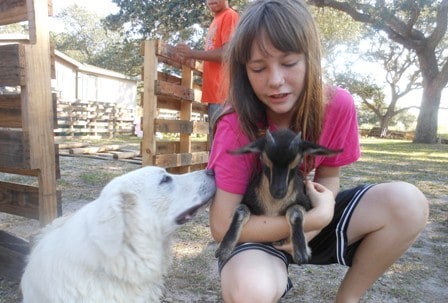
Nigerian dwarf goats for sale
If you want them as pets, it’s best to raise Nigerian dwarf goats from babies or buy them after they have been weaned or bottle-fed. Start small with a few high quality goats and grow your herd from there. The most important thing is to start with a healthy stock.
If you are just getting started, it’s a good idea to buy the highest quality, tested goats you can afford.
You will want to ensure the goats are healthy and disease-free.
In addition, you may consider whether you will buy registered goats or unregistered goats.
Choosing registered goats with a dairy goat pedigree may be important if you want Nigerian dwarf goats for breeding or for milk. You will likely get a higher price if you sell the offspring.
When considering Nigerian dwarf goats for sale, keep in mind that registration doesn’t guarantee they will be disease-free but it provides a paper trail. Check local farms and breeders and ask others in your community where to buy local Nigerian dwarf goats.
The most important thing is to know before buying Nigerian dwarf goats is that they are healthy. As time goes on, and if you decide to add more Nigerian goats to your herd, you can learn more about what to look for regarding teats, utters, milking ability, and breeding.
Nigerian dwarf goat cost
How much does a Nigerian goat cost depends on many factors. As pets, Nigerian dwarf goats can cost $50 – $125. For pedigree-quality, they can range from $200+ depending on the breed traits, coloring, demand, etc. Some breeders can charge up to $500 for a registered Nigerian dwarf goat.
When to buy Nigerian dwarf goats
It’s best to start searching for Nigerian dwarf goats to buy in the fall. By the time spring comes, most of them will already be reserved and sold. When you search in the fall, you will have more options to choose from. This is when breeders decide and release their breeding schedule.
How many Nigerian goats to buy
When you are considering a Nigerian dwarf goat as a pet or to add to your farm, you will want to be sure it has companionship.
Nigerian dwarf goats are herd animals. In order to thrive and be happy, they need a companion. Therefore, it’s best to begin with two or more Nigerian dwarf goats so they can romp and play together.
Alternatively, if you are looking for a companion animal for a horse or a llama, Nigerian dwarfs can serve as companion animals.
How long do Nigerian dwarf goats live?
A Nigerian dwarf goats lifespan varies but know that bringing a Nigerian dwarf goat to your property is a long-term commitment.
The life expectancy for this breed is between 8 – 12 years. Many live as long as 14 – 15 years. Genetic factors and lifestyle can impact how long Nigerian dwarf goats live. See how this compares to other goat breeds: how long do goats live.
When can you breed Nigerian dwarf goats
While dwarf goats can breed year round, they should be fully mature. Therefore, reputable breeders wait until they are a minimum of one year old and older.
Using Nigerian Dwarf Goat for milk
Nigerian dwarfs are becoming increasingly popular among hobby farmers due to their stellar milk production. According to the American Dairy Goat Association (ADGA), the average milk yield per year for a female Nigerian dwarf is 813 pounds.
They average between 1 – 2 pints per day. Each production cycle lasts for roughly 10 months.
Another tidbit that makes this breed a real asset for hobby farmers is that the milk is very high in both butterfat and protein. The butterfat content is between 6 – 10%. Protein content is roughly 4.4%. Ratios will vary by goat based on factors like diet and age.
Nigerian dwarf goats’ milk is commonly used to create butters and cheeses. Many prefer the taste of their milk over what is produced by many full-sized goats used in the mainstream dairy industry.
How much room do Nigerian dwarf goats need?
You can have approximately 10 Nigerian dwarf goats per acre. Nigerian dwarfs don’t actually require the acreage that’s needed for larger varieties of livestock. The important thing is to be able to rotate pasture when possible.
Each goat can comfortably live in an area spanning about 10 square feet. Owning two means you should have a minimum of 20 – 25 square feet.
They will require less sleeping and housing space and more playing and romping space. However, some outside pasture space is required.
The amount of room that’s needed to roam still makes keeping Nigerian dwarfs realistic in both rural and suburban areas.
In fact, more and more towns and municipalities are actually loosening restrictions on keeping livestock specifically to accommodate the growing desire to keep Nigerian dwarfs.
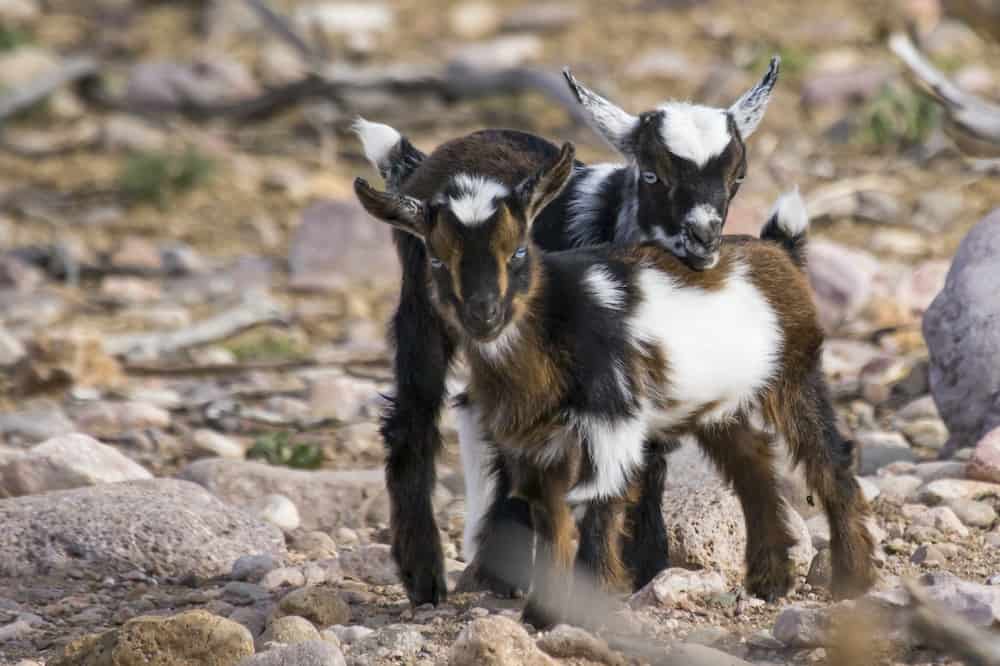
Nigerian dwarf goat practical considerations
It’s important to have enough space to keep your goat without offending neighbors. In addition, there are care practices that must be followed to ensure the health and well-being of your goat.
Here’s a rundown of what goes into caring for a Nigerian dwarf once you welcome it into your family:
- Vaccinations
- Worming
- Supplements
- Routine hoof trimming every four to eight weeks (It’s easy once you learn how to do it.)
- Hay supply
- Feed
- Reliable access to clean, fresh water
- Rotating pasture to minimize parasites
Nigerian dwarf shelter
Nigerian dwarf goats need a clean pen, barn, or shed for shelter from predators and weather. Some considerations to factor in:
- Shade
- Protection from rain and snow
- Warmth
- Safe area to sleep
- Daytime and nocturnal predators
Ideal conditions will be dry and warm. It’s important to keep the goat’s pen area free of dampness or moisture. Moisture inside a goat pen can create issues with rodents and other pests.
It’s important to practice preventive measures to keep mice, rats and flies away from your goat’s living area to prevent diseases and health issues. A goat’s pen should have proper ventilation. In addition, goats require fresh hay to create soft, warm bedding.
The good news is that Nigerian dwarfs can be kept in nearly any climate as long as you provide proper housing. That means a ventilated, draft-free living environment.
Nigerian dwarf goat predators
It’s important to keep some type of perimeter fencing around your property if you’ll be keeping goats. Even the most loyal of goats have been known to wander away to explore what’s going on in the neighborhood.
A fence that’s four feet high will keep your dwarf goats inside but you also need to consider the predators in the area. Having a livestock guardian animal such as a dog, alpaca or llama, and female donkey will help protect your goats.
Consider what lives in your area and what wildlife can be considered a predator.
Some examples of goat predators are coyotes, fox, bobcats, eagles, etc. Some predators become more of a threat around kidding season.
You won’t want electric fencing near your goats; however, you can use it outside of the main wall or fence on your property to detract predators.
Nigerian dwarf goats toys
Goats also appreciate simple toys. You can purchase specific toys that are designed to keep goats entertained and enticed.
Nigerian dwarf goats love to climb. Many owners find that tree stumps and small boulders create nice little “playgrounds” for their goats.
Toys and apparatuses that allow your goat to jump and romp around are best. Give them some space to play, and they will be happy playing with each other.
What do Nigerian dwarf goats eat?
Proper nutrition is really all about ratios when it comes to Nigerian dwarfs. What do Nigerian dwarf goats eat? Knowing the proper answer is very important for keeping healthy, happy goats!
They actually have four separate chambers for processing food instead of one stomach. As you will learn, it’s imperative to feed your goat a balanced diet.
Nigerian dwarf goats will eat hay but it should be in a trough and not touching the ground. Known as foragers, they will eat grasses and weeds as well. What do goats eat
Here’s a quick rundown of the basics of how to feed a Nigerian dwarf goat. Basically, the Nigerian dwarf goat diet consists of:
Goat feed – grain
As goats are growing, they will need goat feed with supplemental copper. Females will need it when they are in later stages of pregnancy and while producing milk.
Hay and alfalfa for Nigerian dwarfs
Goats need plenty of high-quality hay daily, including alfalfa. The most important aspect of goat nutrition is access to fresh, healthy hay. By keeping it off the ground, you will keep it free from parasites. Check with your vet about alfalfa for pregnant and lactating goats.
Foraging and browsing
A typical adult Nigerian dwarf will eat between 3 – 5 pounds of roughage per day while foraging. Goats like access to outside vegetation. However, you must ensure that your property is free of plants that are toxic to goats.
Common, safe treats like dandelions, plantains, chicory, sunflowers, pumpkins, carrots, kale, turnips and squash can all be tasty to goats.
Minerals
Goats need mineral supplementation comprised of salt, calcium, phosphorous, copper, and other vitamins and minerals. The amount of supplementation needed varies based on what is available to goats during foraging.
Clean water
Access to clean, fresh water is also essential.
Veterinarian for Nigerian dwarf goats
It’s important to chat with a veterinarian about the specific nutritional needs of your goat at different points in life to ensure that your animal is getting what it needs to thrive and stay healthy.
According to the Nigerian Dwarf Goat Association (NDGA), many goat breeders use a 12% to 18% protein goat feed or dairy ration.
When feeding your Nigerian dwarf consider different components of proper goat nutrition. Portions and ratios change based on factors like maturity and lactation.
This is a topic that you’ll need to cover with your vet. However, it’s important to have at least an idea of what good goat nutrition looks like if you’re still deciding if this breed is for you.
How long does it take for Nigerian dwarf goats to mature?
They mature in one year. This is faster than most standard-sized goat breeds. Breeding a Nigerian goat with a Nubian goat results in a mini Nubian goat
Gestation
If you are wondering how long are goats are pregnant, the gestation for Nigerian dwarf goats is 145 – 150 days.
Do Nigerian goats smell?
You may be concerned about odors that waft into your home or find their way to your neighbors. The good news is that waste from Nigerian dwarfs is very low in odor. This is one of the reasons why it’s such a pleasant composting material.
However, during mating season, bucks smell. You may be concerned about noises if you’re planning to keep goats in a suburban setting.
Are Nigerian dwarf goats loud?
The answer can depend on the day. Yes, Nigerian dwarfs can get quite loud and boisterous when preparing to mate. Keep in mind that goats come into heat once every month. That means you probably won’t be able to keep your goat a secret from nearby neighbors if you live in a residential neighborhood.
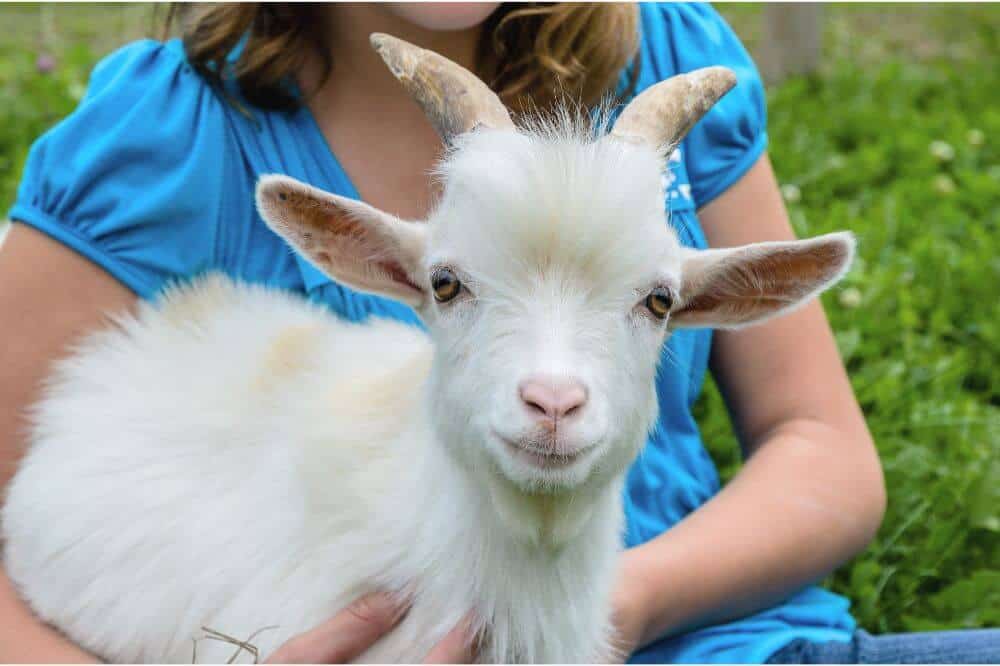
Nigerian dwarf goats vs pygmy goats
There’s a little bit of confusion about the differences between Nigerian dwarf goats vs pygmy goats. Pygmy and dwarf goat breeds can sometimes be the same size. However, they have very different proportions.
Pygmy goats have been primarily raised as meat goats. That means the they have meatier, stockier bodies than dairy goats like Nigerian dwarfs.
You’ll notice that Nigerian dwarfs stand much taller on their slender, longer legs than pygmy goats. Generally, Nigerian dwarfs stand a few inches taller than pygmy goats.
Nigerian dwarf goats friendly pets
You may be wrestling with the idea of getting a Nigerian dwarf. However, the question you really should be wrestling with is if you should get two Nigerian dwarfs!
Remember, these goats are herd animals by design. That means that they really want and appreciate companionship. Even a “herd” of just two goats is better than one. Unfortunately, a lone dwarf goat may be loud or “difficult” because it is lonely.
Lone goats are often nosier because they are calling out for herd companions. Making sure your pet goat isn’t lonely is a beautiful and kind thing for an animal owner to do.
The bottom line is that gentle, mild Nigerian dwarfs make friendly pets as long as you have the space and means to provide your goat with all that it needs to thrive.
While you may choose Nigerian dwarf goats because of their friendly nature and small stature, you will likely love everything about them. Nigerian dwarf females are a reliable milk source helping with sustainable living. We hope this helped with what you want to know about Nigerian Dwarf goats. If you are interested in an a heavy milker, consider an Alpine goat. If a moderate milk producer is more suitable for your backyard farm, consider adding a Toggenburg goat to your farm.
Related:

